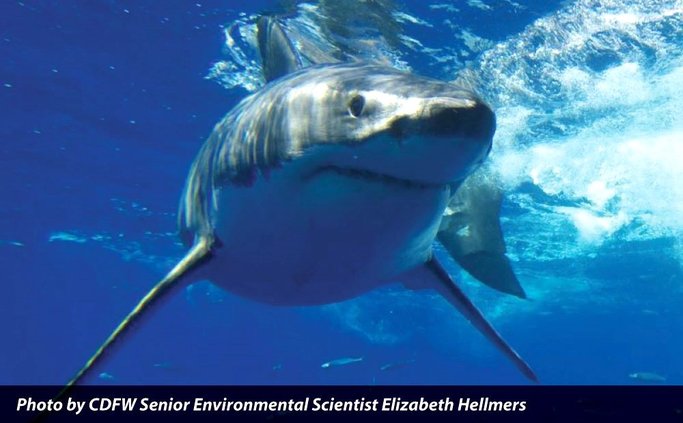Speaking Of Sharks
Q: How often do sharks bite people off the coast of California?
A: California Department of Fish and Wildlife (CDFW) scientists published a study in December 2022 reviewing all available information on California shark incidents. The study showed there were 201 confirmed shark incidents in California waters between January 1950 and December 2021. Among those incidents, 107 caused non-fatal injuries and 15 were fatal.
On average, there were fewer than three incidents annually. The average annual number of incidents resulting in injury was less than two. The average annual number resulting in fatalities was far less than one. While the annual number of reported shark incidents without injuries has increased since 2004, there did not appear to be an increased risk to ocean users, the study showed.
CDFW uses the word “incident” rather than terms like “bite” or “attack” which imply intent on the part of the shark to knowingly harm or consume a person. Most interactions where sharks bite people can be attributed to exploratory bites in which the shark is investigating an object in its environment, or incidents in which the shark mistakes a person for its natural food source. White sharks have been observed biting many non-food items including kelp, floating debris, and other inanimate objects.
Shark incidents in California remain quite rare. However, as with any wilderness activity, entering the ocean includes risks that must be weighed on an individual basis and given a variety of considerations. Kudos to CDFW scientists John Ugoretz, Elizabeth Hellmers and Julia Coates for their valuable and wide-ranging study.
For more information on white sharks see: wildlife.ca.gov/Conservation/Marine/White-Shark
Deer poaching
Q: Can a deer hunter lose their hunting license if they are convicted of a poaching offense?
A: Yes. Decades of wildlife law enforcement have provided anecdotal evidence that the potential loss of future hunting privileges is often more effective than fines to deter future poaching behavior.
The relevant statute comes from California Fish and Game Code section 4340(a) which states: Any person who is convicted of a violation of any provision of this code, or of any rule, regulation or order made or adopted under this code, relating to deer, shall forfeit his or her deer tags, and no new deer tags shall be issued to that person during the then current license year for hunting licenses. Section 4340(b) also specifies that no person described in subsection (a) may apply for deer tags for the following license year.
In addition, the California Fish and Game Commission can suspend or revoke hunting and sport fishing privileges when an individual is convicted of violating the Fish and Game Code or its implementing regulations, per California Code of Regulations, Title 14, section 745.5.
Oil spills
Q: What is CDFW’s role in conserving wildlife habitat after an oil spill?
A: CDFW’s Office of Spill Prevention and Response (OSPR) is the state’s public trustee in protecting, managing and restoring California’s wildlife and habitat after an oil spill.
OSPR works to protect and preserve 3,400 miles of shoreline and 7,700 square miles of state waters from petroleum substances. When a spill occurs, OSPR deploys a team of wildlife officers, scientists and oil spill prevention specialists to manage the state’s response. These responders often work within a unified command that includes federal and local agencies, and the responsible party.
OSPR was established by the Lempert-Keene-Seastrand Oil Spill Prevention and Response Act of 1990. The legislation came on the heels of two major spills, the 1989 Exxon Valdez oil spill in Alaska, in which 11 million gallons of crude oil was released, and the American Trader spill in Orange County in 1990 that resulted in a release of 416,598 gallons of crude oil.
For more visit CDFW’s OSPR web page.
If you have a question you would like to see answered in the California Outdoors Q and A column, email it to CalOutdoors@wildlife.ca.gov.





